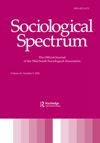Feelings of closeness toward Asian Americans: an analysis of African Americans and Black Caribbeans
IF 1.1
3区 社会学
Q2 SOCIOLOGY
引用次数: 1
Abstract
Abstract Using data from a national sample, I examine Blacks’ feelings of closeness toward Asians in the United States. More specifically, I explore the following: (1) perceived closeness toward Asians, (2) correlates of perceived closeness, and (3) ethnic and national/cultural origin differences in perceived closeness. Results show that feelings of closeness toward Asians are rather similar between African Americans, Jamaicans, Haitians, Spanish-speaking Caribbeans, Trinidadians, and other English-speaking Caribbeans. Ethnic subgroup regression analyses reveal several interesting findings. Only among African Americans, everyday discrimination was negatively associated with feelings of closeness toward Asians. Living in the Northeast was positively correlated with perceived closeness toward Asians. Living in the Midwest, being married, financial strain, and higher educational attainment were correlates of closeness toward Asians only among Black Caribbeans. For Blacks overall, having immigrated to the United States more than 20 years ago was positively correlated with feelings of closeness toward Asians compared to native-born Blacks. While being female and everyday discrimination decreased feelings of closeness, positive Black group evaluation and higher religiosity levels increased feelings of closeness. Considering the growing diversity within the Black population in the United States to assess Black-Asian relations, these findings identify several correlates of their felt closeness toward Asians. These results can improve our understanding of Black-Asian relations more broadly, which is especially crucial given the unique dynamic between these two racial groups and ongoing perception of Black-Asian conflict.对亚裔美国人的亲近感:对非裔美国人和加勒比黑人的分析
我使用来自全国样本的数据,研究了美国黑人对亚洲人的亲近感。更具体地说,我探讨了以下方面:(1)对亚洲人的感知亲密度,(2)感知亲密度的相关关系,以及(3)感知亲密度的种族和民族/文化起源差异。结果显示,非裔美国人、牙买加人、海地人、说西班牙语的加勒比人、特立尼达人和其他说英语的加勒比人对亚洲人的亲近感相当相似。种族亚群回归分析揭示了几个有趣的发现。只有在非裔美国人中,日常歧视与对亚洲人的亲近感呈负相关。居住在东北部的人与亚洲人的亲近程度呈正相关。居住在中西部、已婚、经济压力和较高的教育程度只与加勒比黑人与亚洲人的亲近程度相关。总体而言,与本土出生的黑人相比,20多年前移民到美国的黑人对亚洲人的亲近感正相关。女性身份和日常歧视会降低亲密感,而积极的黑人群体评价和较高的宗教信仰水平会增加亲密感。考虑到美国黑人人口中越来越多的多样性来评估黑人与亚洲人的关系,这些发现确定了他们对亚洲人的亲密感的几个相关因素。这些结果可以更广泛地提高我们对黑人-亚洲关系的理解,考虑到这两个种族群体之间独特的动态以及对黑人-亚洲冲突的持续看法,这一点尤为重要。
本文章由计算机程序翻译,如有差异,请以英文原文为准。
求助全文
约1分钟内获得全文
求助全文
来源期刊

Sociological Spectrum
SOCIOLOGY-
CiteScore
3.80
自引率
5.60%
发文量
16
期刊介绍:
Sociological Spectrum publishes papers on theoretical, methodological, quantitative and qualitative research, and applied research in areas of sociology, social psychology, anthropology, and political science.
 求助内容:
求助内容: 应助结果提醒方式:
应助结果提醒方式:


